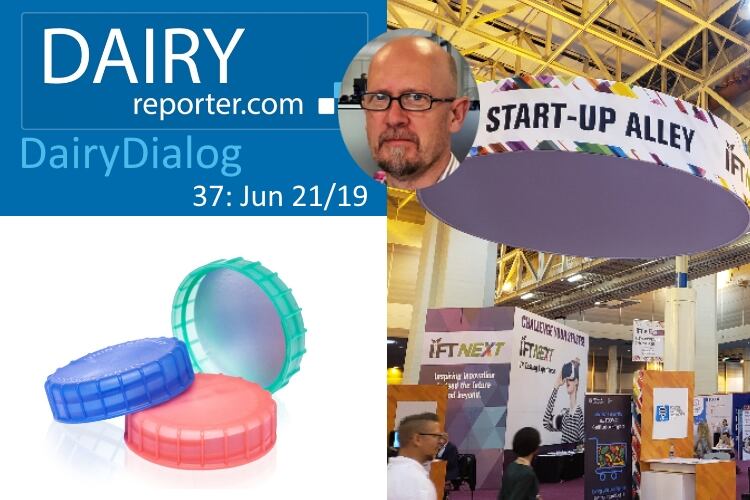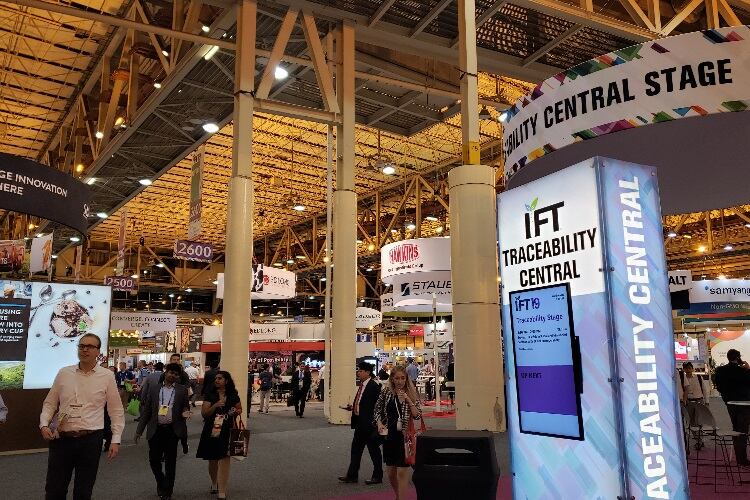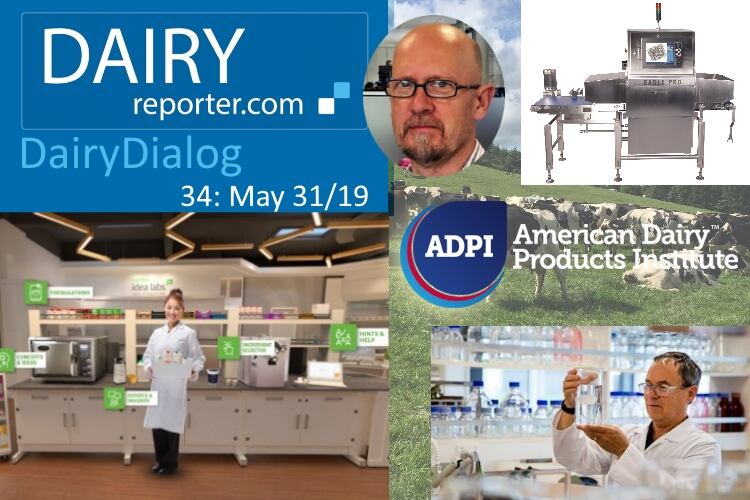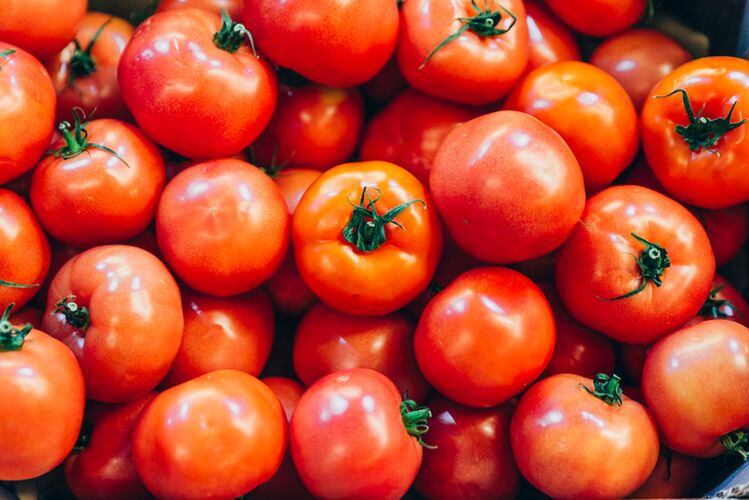IFT
From June 2-5, 2019 nearly 20,000 food and beverage professionals converged on New Orleans, Louisiana for the 79th annual Institute of Food Technologists show (IFT). Attendees visited over 1,000 exhibitors and 100 sessions, representing more than 90 countries.
About three-quarters of those who attend work in the industry (76%), and half hold scientific, technical or R&D roles. IFT says the show attracts those dedicated to the science of food – including industry, government, and academia– to share “the latest research, innovative solutions and forward-thinking topics in food science and technology to tackle our greatest food challenges.”
Next year IFT will move back to Chicago for the next 10 years, from July 12-15, 2020.
From the event, we spoke with Michael Ivey, national sales director of Butter Buds; Hydrosol global commercial director, Brian Walker; DSM Ingredients’ Ingrid Damen, business manager of shelf life solutions; and Salt of the Earth business unit director, David Hart.
Our other interview this week is with Nick Bligh, design & development manager at international company PACCOR.
And we talk to Charlie Hyland from INTL FCStone for the weekly update on the global dairy markets.
Butter Buds
Butter Buds showed off the non-dairy side of its flavor applications at IFT, in which the company has seen good growth over the last few years. The core dairy business of Butter Buds produces ingredients like concentrates, made from homogenizing butter before liquefying it and adding enzymes.
Michael Ivey, national sales director at Butter Buds, told DairyReporter that he expects their non-dairy line to continue growing and expanding along with consumer demand for more flexible and allergen-free options. Butter Buds refers to its non-dairy products as butter ‘types’ to avoid label confusion.
Ivey said it’s important to use clear labeling on both the ingredients side and finished products side of non-dairy foods, and that “if you don’t have the standards of identity and rules behind why you call something what it is, then you’re giving somebody else an unfair advantage.”
Butter Buds has also been investing in clean label products by removing any non-functional ingredients and being more transparent. Ivey shared that the brand’s organic line is growing steadily, and still considers dairy to be Butter Buds’ primary focus moving forward.
Hydrosol
Hamburg-based Hydrosol displayed its stabilizing and texturing systems at IFT for finished products in plant-based formats, focusing on both meat and dairy alternatives. Hydrosol’s global commercial directory Brian Walker spoke to DairyReporter about the company’s plans for the US market.
He thinks the foundation of the plant-based eating trends is the same all over the world, and that the biggest market is flexitarian. Veganism was at first an alternative lifestyle choice, but now animal welfare, sustainability and environmental concerns are driving the category.
Hydrosol offers plant-based alternatives of pizza cheese, cream cheese and sour cream, as well as burger patties, cold cuts and sausages. Walker says there’s a lot more hype around plant-based in the US versus in Europe.
“Demand for plant-based alternatives to meat and dairy products is rising around the world. But plant-based products can be successful only if they offer consumers convincing flavor and texture,” Hydrosol said.
DSM Ingredients
DSM Ingredients of the Netherlands featured its biopreservation ingredients at IFT, paying special attention to products for consumer groups it categorizes as ‘healthy agers,’ ‘proactive adults’ and ‘super kids.’
Ingrid Damen, business manager of shelf life solutions at DSM, spoke to DairyReporter about extending shelf life with natural preservatives for sensitive products like bread and yogurt. She said the US has the longest average shelf life for food and beverages, and that it’s important to most consumers to have shelf-stable options for on-the-go snacking.
Shitij Chabba, VP of marketing at DSM North America, said, “Everything we do starts with the end consumer in mind, which is why we have focused on three core consumer personas - to inspire innovation in highly targeted food and nutrition solutions.”
Salt of the Earth
As a method of sodium reduction and cost savings, Salt of the Earth (SOTE) developed a clean label Mediterranean Umami ingredient, showcased this year at IFT in a mac and cheese prototype that used 10% less cheese than the average.
David Hart, business unit director at SOTE, talked to DairyReporter about the plant-based ingredient’s ability to boost savory flavors, enhance overall flavor profiles, and reduce sodium. He said SOTE is in the process of developing a powder version of the umami.
“After feedback from customers, who were reporting significantly stronger flavors, we started exploring the capacity of Mediterranean Umami to reduce ingredients and contribute to cost savings,” he said.
PACCOR extending next-generation lightweight bottle caps across IML portfolio
PACCOR is extending its next-generation dairy bottle caps, which weigh approximately 13% less than the previous design (1.3g instead of 1.5g) across its entire IML (In-Mould labeling) portfolio.
Ashley Jones, MD, PACCOR UK, said the company has invested a significant amount of resources over the last year at its Mansfield, UK plant to design, test and roll out the continuous compression moulded (CCM) caps.
Since re-launching the dairy closure, where the original weight was 2.2g, the total reduction has been 41%. The applied changes in knurling design contribute also to reduce the required force to open a container by an end user.
“Currently 70% of the tooling capacity has been converted to run Stealth with the project continuing until all have been converted,” said Jones.
Companies that have already signed up to the caps include Müller which rolled it out across its own-brand and private label fresh milk products from February 2019.
Müller’s HDPE fresh milk bottles are already 100% recyclable and the business wants to increase the use of recycled plastic in its bottles to 50% by 2020.
Due to the success of the caps, PACCOR UK has begun to apply similar design principles and technology to conceptual injection moulded cream-pots on its IML product range.
Juergen Lehmann, sales director international, PACCOR, added, as a result, PACCOR (Mansfield) UK will reduce plastic usage on a much bigger scale without compromising the performance of its products.
“The 13% reduction in weight of each cap will equate to approximately 600 tons of plastic used in the company’s production thanks to PACCOR’s production capacity of 3bn caps every year,” he said.




